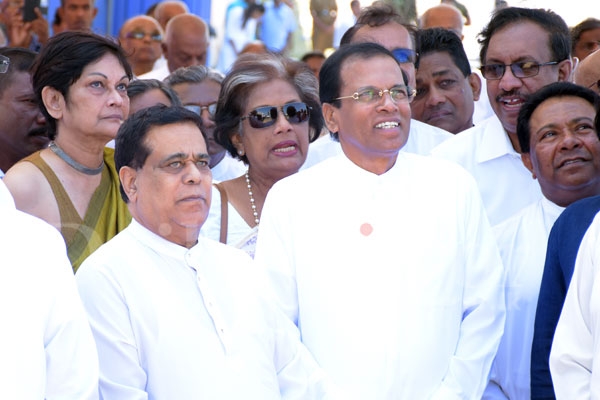President Maithripala Sirisena has written to Speaker Karu Jayasuriya asking whether he can appoint Minister Nimal Sirpala de Silva as a 'minority Prime Minister', highly placed government sources told Asian Mirror.
Although the UPFA attempted to show that they had secured majority in the 225-member legislature, it has now become clear that the party has fallen short of their target. Nevertheless their argument has been that the President can still appoint a new Prime Minister as the agreement between the UNP and the SLFP, signed in September 2015, has expired rendering the current Cabinet of Ministers 'invalid'.
This, however, has become a point of contention in the legal circles as some opine that the 'expiration of the agreement between the UNP and the SLFP' is a 'frivolous argument'.
"We need to look at the definition of a national government. A national government means the party, which commands the support of the highest number of MPs in the House, running a government with the support of other political parties. It does not mean the national government falls apart when one among many party in the ruling coalition opts to sit in the opposition. Even if the SLFP decides to sit in the opposition, there are many other parties, - including the ACMC, the SLMC, Minister Digambaram's party and Minister Mano Ganesan's party - working with the UNP in a common agreement. Therefore, it is still a national government and the expiration of an agreement between two parties does not affect the 'validity' of the current government. Otherwise, the same principle will apply if the SLMC decides to join the opposition tomorrow," a senior lawyer working closely with the government told Asian Mirror.
It is in this context that President Sirisena has written to the Speaker seeking the latter's opinion on the matter. It is learnt that the Speaker will announce his position on the matter soon, after consulting top constitutional lawyers.
Issuing a statement on the current political situation, Lawyers for Democracy, a body of lawyers, said the President had no constitutional right to remove the Prime Minister, as per the 19th Amendment to the Constitution.
Issuing a statement, Lal Wijenaike, K.S. Rathnavale, Sudath Nethsinghe, Prabodha Rathanayake and Harin Gomez said prior to the 19th Amendment to the constitution, the President had power to remove a Prime Minister.
"But, the 19th Amendment to the constitution took that power away," they said.
"following Parliamentary traditions, the only way to "remove" a Prime Minister is to successfully move a no-confidence motion against him/her in Parliament. The President has no role in such a process," the statement said.
According to the 19th Amendment to the constitution, the only way in which a Prime Minister can cease to hold office in terms of article 46 (2) is that if he A) resigns from his office by a writing under his hand addressed to the President B) Ceases to be a Member of Parliament, OR if the Cabinet of ministers is dissolved pursuant to the statement of government policy or the appropriation bill being defeated in Parliament, or passing of a no-confidence motion against the government.










